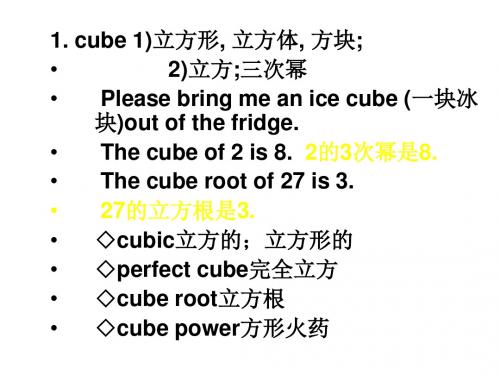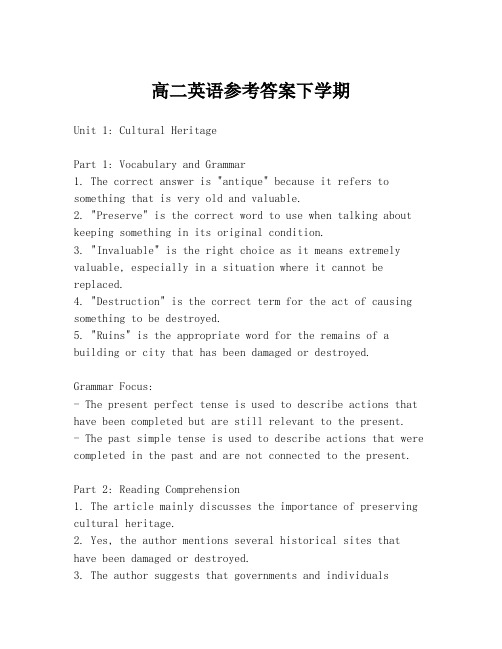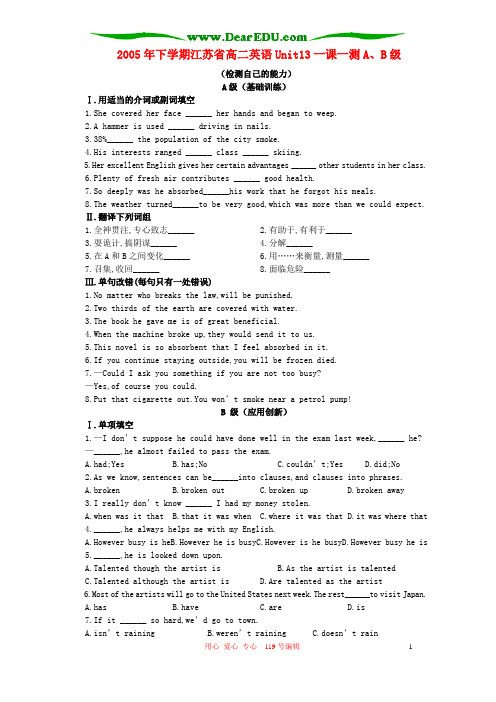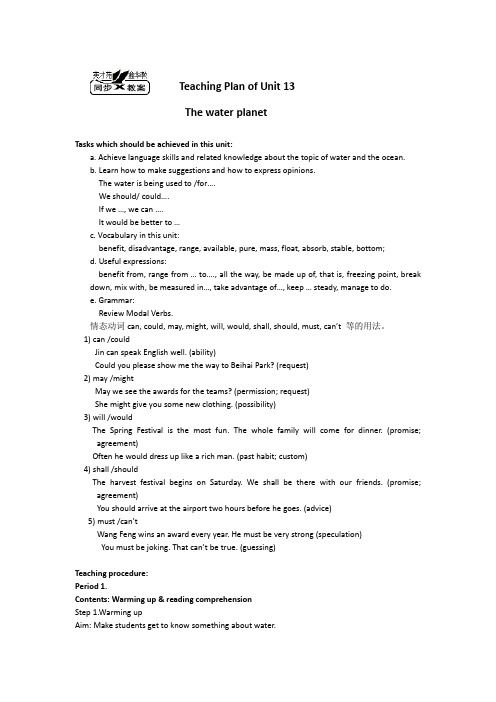高二英语下学期unit-13-reading
- 格式:ppt
- 大小:294.50 KB
- 文档页数:11


高二英语参考答案下学期Unit 1: Cultural HeritagePart 1: Vocabulary and Grammar1. The correct answer is "antique" because it refers to something that is very old and valuable.2. "Preserve" is the correct word to use when talking about keeping something in its original condition.3. "Invaluable" is the right choice as it means extremely valuable, especially in a situation where it cannot be replaced.4. "Destruction" is the correct term for the act of causing something to be destroyed.5. "Ruins" is the appropriate word for the remains of a building or city that has been damaged or destroyed.Grammar Focus:- The present perfect tense is used to describe actions that have been completed but are still relevant to the present.- The past simple tense is used to describe actions that were completed in the past and are not connected to the present.Part 2: Reading Comprehension1. The article mainly discusses the importance of preserving cultural heritage.2. Yes, the author mentions several historical sites that have been damaged or destroyed.3. The author suggests that governments and individualsshould work together to protect cultural heritage.4. The article emphasizes the need for education and awareness about the value of cultural heritage.5. The correct answer is: The author believes that cultural heritage is a vital part of our identity and history.Part 3: Listening1. The speaker talks about the significance of ancient buildings in understanding our past.2. The speaker mentions that some historical sites are in danger due to natural disasters and human activities.3. The speaker calls for international cooperation to protect cultural heritage.4. The speaker highlights the role of technology in preserving and restoring historical sites.5. The correct answer is: The speaker believes that the preservation of cultural heritage is a collective responsibility.Part 4: Writing- Write an essay on the importance of protecting cultural heritage.- Discuss the threats to cultural heritage and the measures that can be taken to preserve it.- Use examples from the reading and listening materials to support your points.Unit 2: The Power of NaturePart 1: Vocabulary and Grammar1. "Tsunami" is the correct term for a series of huge wavescaused by an underwater earthquake or volcanic eruption.2. "Eruption" is the correct word to describe the process where molten rock, ash, and gas are expelled from a volcano.3. "Drought" refers to a period of unusually low precipitation, leading to a shortage of water.4. "Floods" are large volumes of water that overflow onto normally dry land.5. "Volcano" is the correct term for a mountain or hill, typically conical, with an opening in the top, connected to a pool of molten rock below the Earth's surface.Grammar Focus:- The passive voice is used when the action is more important than the person or thing performing the action.- Modal verbs are used to express ability, permission, obligation, or possibility.Part 2: Reading Comprehension1. The article discusses the impact of natural disasters on human life and the environment.2. The author mentions various types of natural disasters, including earthquakes, hurricanes, and floods.3. The article highlights the importance of disaster preparedness and response.4. The author suggests that human activities can contribute to the severity of natural disasters.5. The correct answer is: The author believes that understanding the power of nature can help us better prepare for and mitigate the effects of natural disasters.Part 3: Listening1. The speaker describes the process of a volcanic eruption and its potential consequences.2. The speaker explains the causes and effects of tsunamis.3. The speaker discusses the importance of early warning systems for natural disasters.4. The speaker mentions the role of technology in predicting and monitoring natural disasters.5. The correct answer is: The speaker believes that technology can play a crucial role in disaster management.Part 4: Writing- Write an essay on the impact of natural disasters on society.- Discuss the importance of disaster preparedness and response.- Suggest ways in which individuals and communities can prepare for natural disasters.Unit 3: Scientific AchievementsPart 1: Vocabulary and Grammar1. "Invention" is the correct term for a device, contrivance, or process that has been developed from study, experiment, and trial and error.2. "Discovery" refers to the act of finding something that was not known before.3. "Innovative" is the adjective form of "innovation," which means introducing new ideas or methods.4. "Breakthrough" is the correct term for a significant or sudden advance or development.5. "Experiment" is the correct word for a scientific test orseries of tests to determine how something works.Grammar Focus:- The future simple tense is used to talk about actions that will happen in the future.- The future continuous tense is used to describe actions that will。

2005年下学期江苏省高二英语Unit13一课一测A、B级(检测自己的能力)A级(基础训练)Ⅰ.用适当的介词或副词填空1.She covered her face ______ her hands and began to weep.2.A hammer is used ______ driving in nails.3.38%______ the population of the city smoke.4.His interests ranged ______ class ______ skiing.5.Her excellent English gives her certain advantages ______ other students in her class.6.Plenty of fresh air contributes ______ good health.7.So deeply was he absorbed______his work that he forgot his meals.8.The weather turned______to be very good,which was more than we could expect. Ⅱ.翻译下列词组1.全神贯注,专心致志______2.有助于,有利于______3.耍诡计,搞阴谋______4.分解______5.在A和B之间变化______6.用……来衡量,测量______7.召集,收回______ 8.面临危险______Ⅲ.单句改错(每句只有一处错误)1.No matter who breaks the law,will be punished.2.Two thirds of the earth are covered with water.3.The book he gave me is of great beneficial.4.When the machine broke up,they would send it to us.5.This novel is so absorbent that I feel absorbed in it.6.If you continue staying outside,you will be frozen died.7.—Could I ask you something if you are not too busy?—Yes,of course you could.8.Put that cigarette out.You won’t smoke near a petrol pump!B 级(应用创新)Ⅰ.单项填空1.—I don’t suppose he could have done well in the exam last week,______ he? —______,he almost failed to pass the exam.A.had;YesB.has;NoC.couldn’t;YesD.did;No2.As we know,sentences can be______into clauses,and clauses into phrases.A.brokenB.broken outC.broken upD.broken away3.I really don’t know ______ I had my money stolen.A.when was it thatB.that it was whenC.where it was thatD.it was where that4.______,he always helps me with my English.A.However busy is heB.However he is busyC.However is he busyD.However busy he is5.______,he is looked down upon.A.Talented though the artist isB.As the artist is talentedC.Talented although the artist isD.Are talented as the artist6.Most of the artists will go to the United States next week.The rest______to visit Japan.A.hasB.haveC.areD.is7.If it ______ so hard,we’d go to town.A.isn’t rainingB.weren’t rainingC.doesn’t rainD.has rain8.She couldn’t have answered the question if she______a few books on world history.A.hadn’t readB.hasn’t readC.wouldn’t readD.didn’t read9.Nothing could have saved him ______ he had been tended without delay.A.ifB.even thoughC.as thoughD.once10.—It was 3 o’clock ______ we arrived at the village.—Oh,it was also at 3 o’clock ______we arrived at the village.A.when;whenB.when;thatC.that;thatD.that;when11.—Good morning,Grand Hotel.—Hello,I’d like to book a room for the nights of the 18th and 19th.—______A.What can I do for you?B.Just a minute,please.C.What’s the matter?D.At your service!12.He made another wonderful discovery,______of great importance to science.A.which I think isB.which I think it isC.which I think itD.I think which is13.It was only when I reread this poems recently______I began to appreciate their beauty.A.untilB.thatC.thenD.soⅡ.完形填空A land free from destruction(破坏),plus wealth,natural resources,and labor supply —all these were important 1 in helping England to become the center for the Industrial Revolu- tion. 2 ,they were not enough.Something 3 was needed to start the industrial process.That “something special” was men— 4 individuals who could invent machines,find new 5 of power,and establish business organizations to reshape(改造)society.The men who 6 the machines of the Industrial Revolution 7 from many backgrounds and many occupations.Many of them were 8 inventors than scientists.A man who is a 9 scientist is primarily interested in doing his research 10 .Heis not necessarily working 11 that his findings can be used.An inventor or one interested in applied science is 12 trying to make something that has an actual 13 .He may try to solve a problem by using the theories 14 science or by experimenting through correct and error.Regardless of his method,he is working to obtain a 15 result:the construction of a harvesting machine,the burning of a light bulb,or one of 16 other objectives.Most of the people who 17 the machines of the Industrial Revolution were inventors,not trained scientists.A few were both scientists and inventors.Even those who had 18 or no training in science might not have made their inventions 19 a ground work had not been laid by scientists years 20 .1.A.cases B.reasons C.factors D.situations2.A.But B.And C.Besides D.Even3.A.else B.near C.extra D.similar4.A.generating B.effective C.motivating (动机) D.creative5.A.origins B.sources C.bases D.discoveries6.A.employed B.created C.operated D.controlled7.A.came B.arrived C.stemmed D.appeared8.A.less B.better C.more D.worse9.A.true B.practical C.pure D.clever10.A.happily B.occasionally C.unwillingly D.accurately11.A.now B.and C.all D.so12.A.seldom B.sometimes ually D.never13.A.plan e C.idea D.means14.A.of B.with C.to D.as15.A.single B.only C.specialized D.specific16.A.few B.those C.many D.all17.A.proposed B.developed C.supplied D.offered18.A.little B.much C.some D.any19.A.as B.if C.because D.while20.A.ago B.past C.ahead D.beforeⅢ.阅读理解AHumans have observed and explored the oceans since ancient times.But it wasn’t until the 19th century that the scientific study of oceans began.The first major scientific expedition,and the one that firmly established the field of oceanography,was the around-the-world voyage of H.M.S. Challenger.Setting out from England in 1872,the Challenger spent almost three and a half years gathering a wealth of information about seawater,sea life,and the ocean floor.Major oceanographic expeditions since then have included the South Atlantic voyage of the German ship Meteor in 1926 and the Deep-Sea Drilling Project from 1968 to 1983.Many individuals also have played important roles in advancing our understanding of oceans,beginning with Matthew Fontaine Maury in the mid-1800s;his work on oceanography and navigation led to a uniform system of weather reporting at sea.Since Maury’s time,oceanography has progressed rapidly.Early oceanographers had to contend themselves with tossing buckets overboard to see what they might haul in.Today’s oceanographers are equipped with space images,supercomputer models,and deep-sea robots that can crawl along the seafloor.As they set goals for the future,some oceanographers even dream of doing research in permanently manned stations on the bottom of the oceans.1.Which of the following statements is true?A.Humans didn’t explore the oceans until the 19th century.B.Maury first established the field of oceanography.C.Maury spent a lot of time in studying seawater,sea life,and the bottom of the ocean.D.Many individuals also plays a very important part in advancing our understanding of oceans,such as Maury.2.How many expeditions are mentioned in this passage?A.Four.B.Three.C.Five.D.Two.3.What can we infer from the passage?A.The process of the oceanography has stopped at one time.B.Maury’s work on oceanography contributes a lot to weather reporting at sea.C.Nowadays the equipment for studying the oceans needs improving,because it is out of date.D.The expeditions in the past had great difficulty and made a lot of efforts inorder to study the oceans.BEarth is the third planet from the sun.It is one of the four inner planets.The other three inner planets are Mercury,Venus,and Mars.The inner planets are also called the rocky planets,because they are made of rocks.Earth is often called the “Water Planet”,because it is the only planet in our solar system which has liquid water on its surface.About 70% of the surface of Earth is covered by water! The other part of Earth is made up of continents and islands which have different landforms on them.Examples of landforms are mountains and plains.Plants and animals can live on Earth,because it has so much water.Earth spins very quickly compared to other planets.It only takes Earth 24 hours to spin around its axis one time.One Earth day is 24 hours long!Earth orbits the sun in 365 days! This makes one Earth year 365 days long!Earth is the only planet in our solar system where humans,other animals,and plants can live.There is plenty of water to drink or to live in.Water is present on Earth in its big oceans and in the air! Clouds are made of water vapor.The atmosphere has a lot of oxygen in it for animals to breathe,but the rest of our “air” is made up of water vapor,nitrogen,carbon dioxide,and other gases.The air is perfect for plants to grow.Earth temperature is not the same in all places,but the temperature is just right for plants,animals,and humans in most places on Earth.Like the other inner planets,Earth has volcanoes.Volcanoes on Earth are different from those on other planets,because they still erupt.Scientists think that there may be active volcanoes on other planets and moons in our solar system,but they are still studying this.Earth has one planet which we call the Moon.The surface of the Moon has many craters on it These were caused when meteorites hit it.It has many volcanoes on it which do not erupt anymore.We can see the moon at night without using a telescope.It is the closest space object to our planet,Earth.1.Earth is called the Water Planet,______.A.because animals need waterB.the water makes it look blue from spaceC.it has liquid water on its surfaceD.Earth is the third planet from the sun2.It takes Earth ______to orbit the sun in one year.A.24 hoursB.24 daysC.365 daysD.360 days3.Life exists on Earth,______.A.because the water,air,and temperature are just rightB.there is water vapor in cloudsC.Earth is the planet closest to the sunD.earth has volcanoes4.The craters on the moon were caused by______.A.meteorites hitting its surfaceB.active volcanoesC.volcanoes which do not erupt anymoreD.some reasons that are not mentionedⅣ.短文改错I went out to see a film with my brother aftersupper.On our way to the cinema,we meet an American 1.______girl named Alice,she had got lost and looked very 2.______anxious.We went up to see that was the matter,we 3.______then took him to the hotel.While going there 4.______I told her the great changes that had been taken place 5.______in our country in the past few years and Alice told 6.______us a lot about youth in America. 7.______Although we missed the film,but we felt very happy. 8.______For we had not only helped Alice get out of troubles,but9.______also knew something about the States.We see Englishcan strength understanding and friendship. 10._____Ⅴ.书面表达某英文报“读者来信”专栏正在就高三学生家长是否应该为孩子购置电脑这一话题开展讨论。

高二英语同步辅导Unit11-Unit13必背句子高二(下)Unit11—Unit13必背句子Unit11 Scientific achievements1.Whatever great achievements the future may have in store for China,it is likelythat many of them will be born in northwestern Beijing.无论中国将来会取得什么样的伟大成就,其中许多有可能诞生在北京的西北部。
2.Not all the new companies can succeed, but the spirit and creativitythey represent are more important than money.并非所有的公司都会取得成功,但是他们所体现的那种精神和创造性却比金钱更为重要。
3.The science park is also home to a growing number of overseas Chinesewho have grasped the opportunity to develop their ideas at home.越来越多的海外华人抓住机会到国内来实现他们的理想,中关村科技园也就成为了他们的基地。
4.I will never forget how happy I was when I set foot in China againand was back with my friends and family.我永远也忘不了再次踏上中国的土地和我的朋友及亲人团聚时,那种感觉是多么的幸福。
5.He lives in Beijing and runs small companybased in Zhongguancuntogether with two friends.他住在北京,同两位朋友一起在中关村经营一家小公司。

Teaching Plan of Unit 13The water planetTasks which should be achieved in this unit:a. Achieve language skills and related knowledge about the topic of water and the ocean.b. Learn how to make suggestions and how to express opinions.The water is being used to /for….We should/ could….If we …, we can ….It would be better to …c. Vocabulary in this unit:benefit, disadvantage, range, available, pure, mass, float, absorb, stable, bottom;d. Useful expressions:benefit from, range from … to…., all the way, be made up of, that is, freezing point, break down, mix with, be measured in…, take advantage of…, keep … steady, manage to do.e. Grammar:Review Modal Verbs.情态动词can, could, may, might, will, would, shall, should, must, can’t 等的用法。
1) can /couldJin can speak English well. (ability)Could you please show me the way to Beihai Park? (request)2) may /mightMay we see the awards for the teams? (permission; request)She might give you some new clothing. (possibility)3) will /wouldThe Spring Festival is the most fun. The whole family will come for dinner. (promise;agreement)Often he would dress up like a rich man. (past habit; custom)4) shall /shouldThe harvest festival begins on Saturday. We shall be there with our friends. (promise;agreement)You should arrive at the airport two hours before he goes. (advice)5) must /can’tWang Feng wins an award every year. He must be very strong (speculation)You must be joking. That can’t be true. (guessing)Teaching procedure:Period 1.Contents: Warming up & reading comprehensionStep 1.Warming upAim: Make students get to know something about water.Step 2. Pre-reading1.Show some pictures of making electricity, irritating in agriculture, transport by ships, etc,.2. group work:How is the water being used?Step 3. While-reading1.Scanning: Ss read scan the bold words in the passage and understand the structure of the passage.How many parts are there in the passage?2.Ss read and get the main ideas of each part.Part 1(para1): the properties of water;Part2(Para2): chemical structure of water---H2OPart3(Para3): salinity----- the percentage of salt.Part4(Para4): DensityPart5(Para5): heat capacityPart6(Para6-7) Ocean motionStep 4. After-readingFinish the post-reading Ex on P21.Step 5. Assignment1. surf the internet and get more information about water and ocean using search engines like yahoo or baidu. ( or just input the key words like Jules Verne into the address column of IE)2. discussion:What will you prepare for writing an explanation of corals?After discussion, work out an outline.Period 2.Contents: difficulties in the passage.Step 1. Warming upAsk some Ss to present their homework.Step 2. Learning about the language:Play the tape for students to follow.Teacher explain some language points in the text on page 19--20.1. Who benefits from using water in this way?Benefit…from/ by…This song reminds me of France.Remind me to answer the letter.I reminded her that the book would cost her much.2. Life in the oceans ranges from the tiniest plankton all the way to giant like sharks andwhales.Range from… to…/ range between …. And…. 意为“从。

高二英语Unit 13 People〔I〕北师大版【本讲教育信息】一. 教学内容:Unit 13 People〔I〕Teaching aims:知识目标:1. 掌握本单元出现的重要词汇与其用法。
2. 通过阅读本单元的阅读材料掌握一些有用的句型,提高阅读能力。
3. 锻炼学生的听说能力。
4. 学习和掌握Past Participles的用法并学习使用情态动词表示猜测的用法。
技能目标:学习客观准确地描述和分析一个人的特征和性格。
德育目标:正确认识自我,确立正确的人际交往意识。
Teaching important and difficult points:1. Learn about Past Participles and model verbs to make guesses.2. Write a description of a person.本课时教学目标:掌握本单元出现的重要词汇与其用法.beard n.〔下巴上的〕胡须moustache 髭须whiskers 颊须,连鬓胡子blond n. 金发碧眼的人,尤其指女人adj. 浅黄色的,金色的blond hair 金色的头发teenager n. 青少年,十几岁的孩子adj.teenage 十几岁的,青少年的from side to sidefrom all sides / from every side 从各个方面e.g. We must study this problem from all sides.我们必须全方面地研究这个问题。
side by side 肩并肩stand by one’s side 站在某人旁边,从道义上支持某人take sides with sb. / take the side of sb. 同意某人的观点,支持某人pay attention (to) 注意pay little / no / much attention to不注意/很注意e.g. Much attention has been paid to the question.come up with 提出The question that they came up with is very important.请比照put up withcatch up withgifted adj. = talented 有天分的,有才华的a gifted singer / studentbe gifted in / at sth.n. 天份,才华,礼物have a gift for sth. 对……有天份a man of many gifts 一个多才多艺的人a birthday gift 一份生日礼物vt. 赠送gift sb. with sth. / gift sth. tosb.promise n. 诺言keep one’s promise / break one’s promisev. 许诺,答应He promised to support me.I want you to promise me one thing .She promised me to see the film.It promises to be warm this afternoon.promising adj. 有前途的She is a promising singer .matter n. 物质,事物vi. 重要—I forgot to bring you the dictionary.—It doesn’t matter.It matters that you haven’t finished your work on time.concentrate 集中,专心致志于vi. We should concentrate on / upon how to prevent water pollution . vt. I always concentrate my attention on what the teacher says in class . concentration n.a boy of little concentration 一个不专心的男孩注意比拟center on / focus ontalk sb. into doing sth. ask / beg / try to persuade sb. to do sth. solution n. 解决方法常与介词to连用the solution to this matter同类的词还有:the key to the lockthe answer to the questionthe entrance to the buildingthe index to the bookdescribe vt. 描述,形容,表示Words can’t describe my joy .We don’t agree to describe him as a hero .description n. 描述beyond description 难以形容种类of all descriptions 各种各样的disabled adj. 残疾的He was disabled in the accident .the disabled 残疾人〔总称〕The disabled are taken good care of in that city .disability n.His disability prevents him from getting a job .( 无能,不可数)People with physical disabilities are called the disabled .(残疾,可数)fail v. fail to do sth. 忘记做,没能做Don’t fail to ring me .fail in doing sth. 做某事失败了Tom failed in passing the driving test .failure n. 失败Failure is the mother of success .失败是成功之母。
Uniit13 peopleLesson 1 EQ: IQThe first period : 90 minutes1.Teaching aims1)Knowledge objectives :Help students to grasp the new words and expressions;Help students to learn the functions of Past Participles;Help students to know something about EQ and IQ.2)Ability objects :Help students to pronounce and use the new words and expressionscorrectly;Help students to use the Past Participles to make sentences correctly;Help students to develop the ability of teamwork and thinking alone.3 Teaching important and difficult points1)The new words and expressions2)Grammar : Past Participles founction as attributte , adverbial,predicate and object complement .4.Teaching approaches : listening and disscussion5.Teaching aids :tape, recorder , blackboard6Teaching processStep one : Lead in (6 minutes )Ask students to list some qualities of a successful person .Thenclassify them into IQ and EQ and introduce more information.And then ask students to disscuss which one is more important for one'ssuccess.Step two : Teach sdudents how to prounce he new words and phrasesand explain them generally. (6 minutes)aircraft ['εəkrɑ:ft] n. 飞机航空器emergency [i'mə:dʒənsi] n.紧急情况pray [prei] vt/vi祈祷祷告gifted ['ɡiftid] adj.有天赋的accurately adv.精确地准确地draw up 起草description n.描述形容academic [,ækə'demik] adj 学术的predict[pri'dikt] vt 预言预测deserve [di'zə:v] vt. 应受,应得failure n.失败mistaken [mi'steikən] adj.错误的association [ə,səusi'eiʃən] n. 协会,联想thus [ðʌs] adv. 因此;如此possibility [,pɔsə'biləti] n. 可能性disability [,disə'biləti] n. 残疾;无能entirely [in'taiəli] adv. 完全地hers [hə:z] pron. 她的(所有格)theirs [ðεəz] pron. 他们的;她们的;它们的Easter n. [宗]复活节embassy ['embəsi] n. 大使馆accuse [ə'kju:z] vt. 控告,指控;谴责Step three :Learn the passage in details1) Ask students to listen to the tape and answer tne questions in thebook.(8 minutes)2)learn tne passage paragraph by paragraph (30minutes)A impotant words and expressionspredict vt. 预报,预言eg:How do people predict the future in your country?人们是怎样预料你们国家未来的?eg:So don't predict, just measure.记住,不要预测,要实测。
高二英语Unit 13〔II〕人教版【本讲教育信息】一. 教学内容:Unit 13〔II〕二. 难点句解析语法复习:情态动词三. 知识总结归纳:〔一〕难点句解析:1. This mixing of fresh and salt creates a unique environment filled with life of all kinds—a zone between the land and the sea.这种淡水与咸水的混合创造出一个充满着多种生物的独特环境。
filled with life of all kinds做定语修饰a unique environment;而a zone between the land and the sea.如此是a unique environment的同位语。
说明a unique environment的性质。
unique:独特的;独一无二的,没有比拟级和最高级形式。
Her style of painting is unique.Each of us is a unique, worthwhile individual.名词+ of all kinds:各种各样的Seafood of all kinds is available in the states along the coast.=All of kinds of seafood are available in the states along the coast.People of all kinds became very interested in the new popular culture.2. Here, animals can enjoy all the benefits of the oceans without having to face many of the dangers.在这里,动物可以享受到海洋的一切好处又不用面临危险。
Unit13 PeopleWarm-up 热身Listen to the police description.听警方的描述Which people in the photo below are the police looking for?下面图片中的哪个人是警方要找的对象Police are looking for four people in connection with a crime.警方正在寻找与案件有关的四个嫌疑人They were last seen in the London area.他们最后一次出现是在伦敦The first is a white man.第一个是白人He is quite tall with short, dark hair.他个头很高,留着黑色的短发He was last seen wearing a black baseball cap, a blue long-sleeve shirt and sunglasses.他最后一次出现时戴着一顶黑色的棒球帽、一副太阳镜,穿着一件蓝色的长袖衬衫。
The second is a white man wearing glasses.第二个是戴着眼镜的白人He has little hair and was last seen wearing a white shirt and holding books under his arm.他头发很少,最后一次出现时穿着白色的衬衫,腋下夹着书The third is a black woman.第三个是黑人妇女She has short hair and was last seen wearing a black and white T-shirt with a gold chain around her neck. 她留着短发,最后一次出现时穿着黑白相同的T恤,脖子上戴着金项链。
Units 13~14The water planetFreedom fightersⅠ.单项填空1.Nuclear science should be developed to ________the people rather than harm them.A.benefit B.contribute C.protect D.affect解析:benefit sb.“对某人有益”。
答案:A2.For more than 20 years, we’ve been supporting educational programs that ________ from kindergartens to colleges.A.spread B.move C.shift D.range解析:range from...to...“范围从……到……”。
答案:D[3.When I opened the door, I found my father sitting in his chair, completely ________ a magazine.A.absorbing in B.absorbed in C.absorbing to D.absorbed to解析:此处absorbed in作伴随状语,意为“专心于”。
答案:B4.The teacher asked a difficult question, but Ted, finally, managed to ________ a good answer.A.put up with B.keep up with C.come up with D.go through with解析:come up with“提出,提供”“想出”。
答案:C5.We regret to inform you that there are no tickets ________ for Friday’s performance.A.available B.spare C.convenient D.affordable解析:“星期五演出的票没有了”,available“可提供的,可得到的”,常作后置定语。